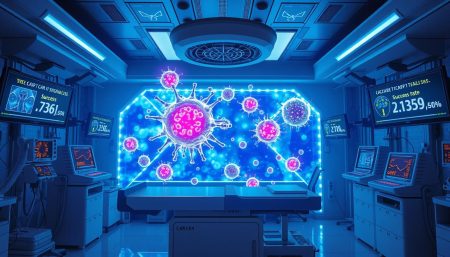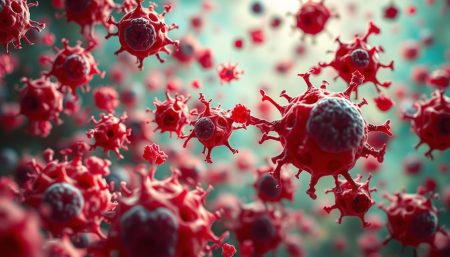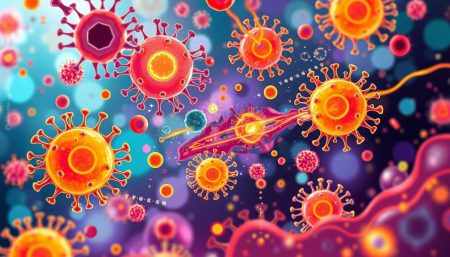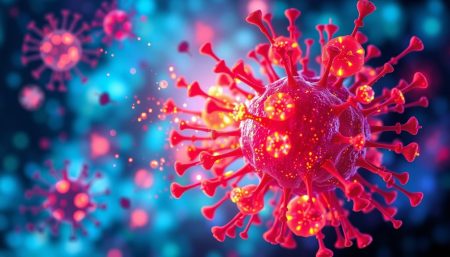The term “blood cancer” might sound simple, but it covers many diseases. Each one has its own challenges and details. Knowing about blood cancer symptoms is key for catching it early and treating it well.
Learning about blood cancer awareness is just as important as finding new treatments. Today’s oncology is always getting better, thanks to research and new therapies. This brief overview covers the basics of blood cancer, preparing you for a deeper look into this tough disease.
Key Takeaways
- Grasping the breadth and diversity of blood cancers is crucial for precise diagnosis and treatment.
- Early recognition of blood cancer symptoms can significantly influence treatment outcomes.
- Ongoing advancements in oncology are paving the way for more effective cancer treatment breakthroughs.
- Raising blood cancer awareness plays an essential role in the fight against this disease.
- Understanding the importance of new therapeutic approaches is a beacon of hope for patients with blood cancer.
Introduction to Blood Cancer
Understanding blood cancer starts with knowing its complex nature and different types. It’s a key part of oncology, making it crucial for good healthcare. Cancer diagnosis early on can greatly improve treatment results and survival chances.
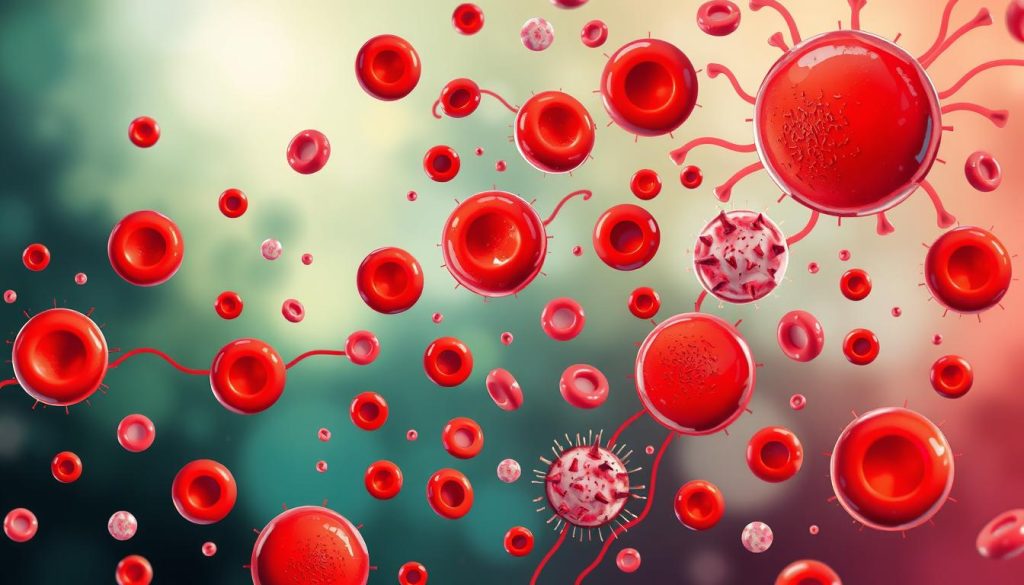
Doctors stress the need for quick and accurate diagnosis systems. This helps patients get the right care fast. Spotting blood cancer signs early is also key, as it’s a big part of beating the disease.
Here’s why early detection matters and how it fits into good healthcare:
- Quick cancer diagnosis makes treatments work better.
- Understanding blood cancer means knowing symptoms, risks, and tests.
- We need many healthcare interventions to tackle cancer’s physical and mental sides.
This approach shows how urgent it is to keep improving our fight against blood cancer.
What is Blood Cancer?
Blood cancer is a group of diseases that affect how your blood cells are made and work. This part explains how these diseases impact your blood and bone marrow.
Overview of Hematologic Malignancies
Blood cancers start in the bone marrow, where blood is made. They can mess up how blood cells grow and work. This leads to different blood problems. Blood cancers include leukemia, lymphoma, and myeloma.
Impact on Blood Cells and Bone Marrow
Blood cancers really hurt how the bone marrow works and makes blood cells. The bone marrow is key for making blood cells but gets damaged by cancer. This makes it hard to make healthy blood cells, letting bad cells grow more.
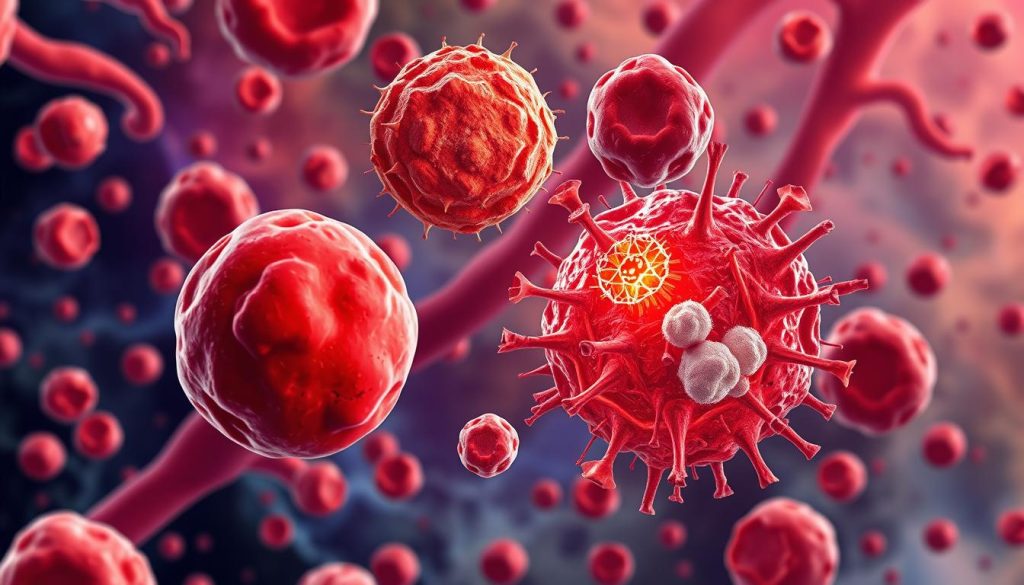
It’s important to understand how these cancers work to find better treatments. Research is helping us find new ways to fix bone marrow problems and manage blood disorders.
Main Types of Blood Cancer
Exploring the main types of blood cancer helps us understand their unique characteristics and effects. This section looks at leukemia, lymphoma, and myeloma. These subtypes show the complexity of cancers affecting blood, bone marrow, and the lymphatic system.
Leukemia: The Proliferation of White Blood Cells
Leukemia is marked by the fast growth of abnormal white blood cells. These cells take over, making it hard for the body to fight off infections and carry oxygen. It comes in different types, each with its own pace and cell type.
Lymphoma: Cancer of the Lymphatic System
Lymphoma attacks the lymphatic system, key to our immune defense. It mainly shows up as Hodgkin lymphoma and non-Hodgkin lymphoma. Both types harm lymphocytes, weakening our immune response.
Myeloma: Cancer Affecting Plasma Cells
Myeloma affects plasma cells, important for making antibodies. It grows in the bone marrow, messing with normal blood cell and antibody production. This raises the risk of infections and other issues.
| Cancer Type | Primary Impact | Common Subtypes |
|---|---|---|
| Leukemia | White Blood Cells | Acute Lymphocytic Leukemia, Chronic Myelogenous Leukemia |
| Lymphoma | Lymphatic System | Hodgkin Lymphoma, Non-Hodgkin Lymphoma |
| Myeloma | Plasma Cells | Multiple Myeloma |
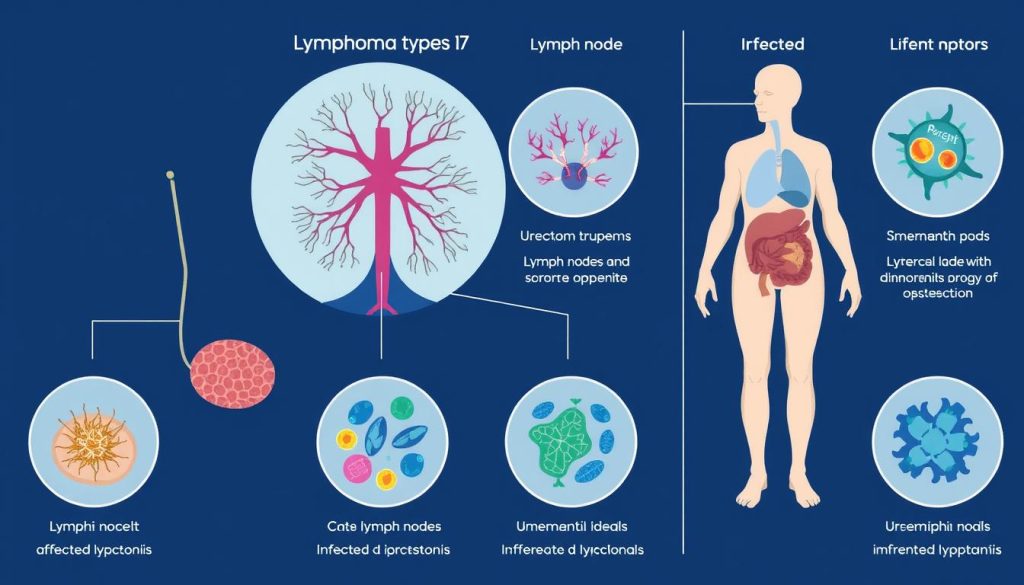
Knowing about these cancer subtypes helps patients and caregivers tackle their unique challenges. Treatment plans are made to fit each type of cancer. This shows how crucial accurate diagnosis and specialized care are.
Signs and Symptoms of Blood Cancer
It’s important to know the signs of blood cancer early. This helps in getting the right treatment on time. Symptoms that don’t go away can really affect your life. So, it’s key to spot them early.
Early Warning Signs
Unexplained weight loss and constant tiredness are big signs. These symptoms can sneak up on you. When you notice them with other cancer symptoms, it’s time to see a doctor fast. Night sweats and a low-grade fever that won’t go away are also warning signs.
Physical Manifestations of Blood Cancer
Blood cancer can show itself in many ways. You might feel lumps in your lymph nodes or notice bruises and bleeding for no reason. Rashes or itchy skin can also be signs of something wrong.
To learn more about these symptoms and blood cancer, check out a detailed guide on the topic.
When to Seek Medical Attention
If symptoms last longer than they should, see a doctor. Fatigue, fever, and unexpected weight loss need attention. Sudden pain or changes in symptoms are urgent signs to see a doctor right away.
| Symptom | Associated Condition | Urgency for Medical Checkup |
|---|---|---|
| Unexplained Weight Loss | Potential Early Indicator | Medium |
| Night Sweats | Common in Lymphomas | High |
| Excessive Bruising/Bleeding | Platelet Dysfunction | High |
| Persistent Low-Grade Fever | Sign of Immune Response | Medium |
Risk Factors and Causes
Understanding what causes blood cancer is key to fighting it. Knowing the cancer risk factors and genetic predisposition helps us find ways to prevent it.
Genetic Influences and Heredity
Genetics greatly affect a person’s chance of getting blood cancer. Having a genetic predisposition doesn’t mean you’ll get cancer. But it does make it more likely. So, genetic counseling is vital for cancer prevention.
Environmental Triggers
Some chemicals and radiation can raise the risk of blood cancer. These factors work with genetics to increase the cancer risk factors.
| Genetic Factor | Environmental Trigger | Impact on Cancer Risk |
|---|---|---|
| Family history of blood cancer | Exposure to benzene | Increases risk |
| Pre-existing genetic mutations | Radiation exposure | Significantly elevates risk |
| Inherited immune system disorders | Pesticide exposure | Moderately increases risk |
Diagnosing Blood Cancer
Getting a correct and timely cancer diagnosis is key to treating blood cancer well. This part talks about the detailed steps to find cancer, especially diagnostic tests for cancer and the important biopsy procedure.
Types of Diagnostic Tests
Several tests are done to find blood cancer. Blood tests look for odd white, red cells, and platelets. Imaging tests like CT scans and MRIs show bone marrow activity. Molecular tests find genetic changes.
The Role of Biopsy in Diagnosis
The biopsy is a crucial step in confirming a diagnosis. It takes a small bone marrow sample for microscopic check. This shows the cancer type and stage, helping plan treatment.
Treatment Options for Blood Cancer
There are many treatments for blood cancer today. These include both traditional methods and new, experimental approaches. Patients can choose from well-known treatments or join clinical trials for cancer.
Traditional Approaches to Treatment
Traditional cancer therapy has been around for a long time. It includes chemotherapy, radiation, and surgery. These methods work well against blood cancer by targeting fast-growing cancer cells.
But, they can also cause side effects. These side effects can really affect a patient’s life quality.
Emerging Therapies and Clinical Trials
Cancer research is always changing. Clinical trials are key in finding new treatments. They help create targeted therapies that are more effective and have fewer side effects.
New treatments include CAR T-cell therapies and bi-specific antibodies. CAR T-cell therapy changes a patient’s T cells to fight cancer better. Bi-specific antibodies help the immune system attack cancer cells more effectively.
| Traditional Therapy | Emerging Therapy |
|---|---|
| Chemotherapy | CAR T-cell Therapy |
| Radiation Therapy | Bi-specific Antibodies |
| Surgical Removal | Checkpoint Inhibitors |
The future of cancer treatment looks promising. With new treatments and clinical trials, we might see more personalized and less invasive options. This is a hopeful time for medical science.
Understanding Chemotherapy
Chemotherapy is a key way to fight blood cancer. It uses special drugs to kill cancer cells. This helps stop them from growing and spreading.
Chemotherapy works by using strong chemicals that harm cancer. But, it can also cause chemotherapy side effects. These can really affect a person’s life.
| Chemotherapy Drug | Common Use | Typical Side Effects |
|---|---|---|
| Cyclophosphamide | Leukemia, Lymphoma | Nausea, Hair loss, Low white blood cell count |
| Methotrexate | Leukemia | Mouth sores, Fatigue, Liver dysfunction |
| Doxorubicin | Lymphoma, Leukemia | Cardiotoxicity, Hair loss, Nausea |
Cancer drugs are picked based on the cancer type and stage. They are often used together for the best results. Finding the right dose is a big challenge for doctors.
Handling chemotherapy side effects is key to treatment. Side effects like nausea and fatigue need quick action. This helps keep patients healthy and on track with treatment.
This comprehensive approach to chemotherapy not only aims to eradicate cancer cells but also underscores the importance of supportive care in managing side effects to preserve patient well-being.
Every person’s journey with chemotherapy is different. Treatment plans must be tailored to each person’s needs. Thanks to research, cancer drugs are getting better. This brings hope and a better life to those facing chemotherapy’s challenges.
Radiation Therapy Explained
Radiation therapy is a key treatment for blood cancers. It uses high-energy rays to kill cancer cells. This is crucial when cancer is in one place or before bone marrow transplants.
The way cancer radiation treatment is given is very careful. It aims to hit cancer cells hard but spare healthy ones. New tech like IMRT and IGRT make treatments better and safer.
Radiation side effects can differ for each person. They depend on the dose and where it’s given. Side effects might include tiredness, skin issues, and some pain. Doctors keep a close eye on these to help patients live well.
- Targeted delivery to minimize damage to healthy cells
- Technological advancements improve treatment precision
- Support and care for managing radiation side effects
It’s important to find the right balance in radiation therapy. This means using the latest tech and caring for patients. Radiation is a key part of cancer radiation treatment.
Stem Cell Transplantation
Stem cell transplantation is a key treatment for many blood cancers. It gives patients new, healthy cells to help their immune systems recover. We’ll look at two main types: bone marrow transplant and peripheral blood stem cell transplant. Both are important in stem cell therapy.
Bone Marrow Transplant
The bone marrow transplant is a traditional method. It replaces damaged bone marrow with healthy stem cells. These cells are usually from a matched donor and are vital for blood cell production and bone marrow health.
Peripheral Blood Stem Cell Transplant
The peripheral blood stem cell transplant takes stem cells from the bloodstream, not the bone marrow. It’s more popular because it’s less invasive and recovery is faster.
| Transplant Type | Source of Stem Cells | Recovery Time |
|---|---|---|
| Bone Marrow Transplant | Bone Marrow | Varies, typically longer |
| Peripheral Blood Stem Cell Transplant | Bloodstream | Generally shorter |
Both transplant methods are crucial in stem cell therapy. They offer hope and a chance for a cure for blood cancer patients. The choice depends on the patient’s condition and medical advice.
Targeted Therapy in Blood Cancer Treatment
Targeted therapy is a big step forward in treating blood cancer. It focuses on precision medicine and tries to harm healthy cells less. This method uses molecular therapy to find and attack specific targets on cancer cells.
Mechanisms of Action
Targeted therapy works by targeting and stopping the growth of cancer cells. It focuses on proteins and genes that cancer cells have but healthy cells don’t. This helps block the disease’s growth and spread.
Types of Targeted Agents
There are several types of targeted agents for blood cancer treatment:
- Monoclonal antibodies (mAbs) – These are made to find and stick to specific proteins on cancer cells.
- Tyrosine kinase inhibitors (TKIs) – They stop enzymes that help cancer cells grow.
- BCL-2 inhibitors – These help kill cancer cells by blocking survival proteins.
Each type uses a different way to fight cancer. Together, they help create personalized treatment plans in modern cancer care.
Using targeted therapy can make treatments more effective and reduce side effects. This approach is key to the shift towards precision medicine in cancer treatment.
Immunotherapy: Harnessing the Immune System
Immunotherapy is a key part of cancer treatment. It boosts the body’s cancer immune response. This approach helps the immune system fight cancer better, especially in blood cancer.
Immunotherapy uses different therapies to teach the immune system to find and kill cancer cells. It’s a growing field that gives hope to those who didn’t respond well to other treatments.
One big plus of immunotherapy is it can lead to long-term cancer control. It turns a serious disease into a manageable one. In blood cancer, where the immune system is weak, immunotherapy is vital. It’s improving the outlook for many patients.
- Checkpoint Inhibitors: These drugs help the immune system recognize and act against cancer cells by blocking proteins that interfere with immune response.
- Monoclonal Antibodies: They are designed to target specific markers on cancer cells, aiding in their destruction.
- Cancer Vaccines: These vaccines boost the body’s immune response against cancer cells.
- Adoptive Cell Transfer: Patient’s immune cells are modified in the lab to improve their ability to target cancer cells.
Each immunotherapy type has its own benefits and works in different ways. They are important parts of treating blood cancer. Keeping up with new research is key for doctors and patients to get the best results.
More research and success stories show how important immunotherapy is in cancer treatment. As we learn more, immune treatments will likely become even more effective. This brings new hope to patients all over the world.
Managing Side Effects and Symptom Management
Effective side effects management is key in supportive cancer care. It aims to improve patient quality of life after treatment. Recovery is about taking care of both body and mind.
Dealing with the Aftermath of Treatment
Post-treatment care focuses on managing side effects. These can change based on the treatment type and intensity. Care includes sticking to medication, making lifestyle changes, and regular check-ups.
Supportive Care for Quality of Life
Supportive care is vital for keeping patients healthy in body, mind, and spirit. It offers services like nutrition advice and psychological support. These are tailored to meet each patient’s needs, improving their daily life.
| Aspect of Supportive Care | Benefits |
|---|---|
| Physical Health Management | Reduces physical side effects, promotes recovery |
| Emotional and Mental Health | Improves mental health and emotional resilience |
| Social and Behavioral Support | Enhances social interactions, modifies behavior affecting health |
| Nutritional Support | Optimizes dietary intake, supports immune function |
The Psychological Impact of Blood Cancer
Being told you have blood cancer can feel overwhelming. It affects you not just physically but also mentally. It’s important to understand cancer’s psychological impact to get the best care. This part talks about how to keep your mental health strong and find the right cancer patient resources.
Maintaining Mental Health During Treatment
Patients going through cancer treatment need mental health support. This support helps with the emotional, psychological, and social challenges they face. Counseling, therapy, and support groups can help manage stress, anxiety, and depression.
Resources and Support for Patients and Families
Having a strong support system is key for patients and their families. Here are some important cancer patient resources:
- Local Cancer Support Groups that offer a community understanding of the challenges faced by blood cancer patients.
- National cancer organizations provide comprehensive guides and toolkits for better coping strategies.
- Online platforms where patients and families can connect and share experiences, which can significantly reduce feelings of isolation.
Financial and legal counseling services are also crucial. They help manage the non-medical impacts of the disease.
| Resource Type | Details | Benefits |
|---|---|---|
| Emotional Support | Counseling, therapy, support groups | Helps manage stress, anxiety, depression |
| Educational Material | Brochures, websites, workshops | Increases understanding of disease and treatments |
| Financial Aid | Grants, fundraising assistance, insurance advice | Alleviates financial burden of treatment |
Advancements in Blood Cancer Research
Recent advances in cancer research have led to significant medical breakthroughs in blood cancer treatments. Ongoing efforts in cancer therapy innovation make the future brighter for patients.
Developments focus on tailored therapies that target cancer cells without harming healthy tissues. These innovations boost survival rates and improve patients’ quality of life during treatment.
- Genetic Targeting: Advances in cancer genetics allow for more precise therapies. This leads to more effective and less toxic treatments.
- Immunotherapy Breakthroughs: Improvements in immunotherapy, like CAR T-cell therapy, make the body’s immune system fight cancer better.
- Enhanced Drug Formulation: New drug formulations can now penetrate the blood-brain barrier. This offers hope for cases where cancer has spread to the brain.
In the fight against blood cancer, ongoing cancer research is key. These medical breakthroughs show our relentless pursuit of knowledge. They highlight significant strides in cancer therapy innovation.
These advancements have deep implications, offering new therapy options and bringing us closer to a cure. As we push science’s boundaries, research and development remain crucial.
| Innovation | Description | Impact on Treatment |
|---|---|---|
| CRISPR Gene Editing | A technology that can edit parts of the genome by removing, adding, or altering sections of the DNA sequence. | Allows for precise genetic mutations to be corrected before they can cause cancer. |
| Nano-Drug Delivery | Uses nanoparticles to deliver drugs directly to cancer cells, minimizing damage to healthy cells. | Reduces side effects and improves drug effectiveness, potentially transforming standard cancer treatment protocols. |
| Bi-specific Antibodies | Designed to engage two different targets simultaneously, these antibodies can engage cancer cells more effectively. | Improves the immune system’s ability to target and destroy cancer cells, potentially leading to better patient outcomes. |
The landscape of blood cancer treatment is rapidly evolving, offering a hopeful future. Each breakthrough leads to better outcomes and shows our shared dream of a cancer-free world.
Conclusion
The journey with blood cancer is filled with challenges and medical breakthroughs. This article has covered the basics of leukemia, lymphoma, and myeloma. It also talked about the signs and the treatment process.
Patients and doctors face a complex world. But, there’s hope and progress in fighting cancer. This shows our strength and the steps forward we’re taking.
There are many treatments for blood cancer, like chemotherapy and new therapies. Stem cell transplants offer hope for a life after cancer. Research and new treatments keep opening doors for those with blood cancer.
Doctors, researchers, and support teams are all working together. Patients and their families are also part of this fight. Their stories show the power of science, determination, and hope.
This journey is a mix of science, hard work, and hope. It shows the importance of never giving up in finding new treatments. Together, we’re making progress and supporting each other through this tough time.
FAQ
Q: What are the different types of blood cancer?
A: Blood cancer types include leukemia, affecting white blood cells. Lymphoma impacts the lymphatic system. Myeloma is cancer of the plasma cells.
Q: What are some common symptoms of blood cancers?
A: Symptoms include fatigue, fever, night sweats, and weight loss. Bone/joint pain and frequent infections are also common. If these symptoms last, see a doctor.
Q: How is blood cancer diagnosed?
A: Tests like blood tests and bone marrow biopsies diagnose blood cancer. Imaging scans are also used. The tests depend on the suspected cancer type.
Q: What genetic factors contribute to blood cancer?
A: Genetic mutations and chromosomal abnormalities can cause blood cancer. Family history of these cancers also increases risk.
Q: Can environmental factors cause blood cancer?
A: Yes, radiation and chemicals like benzene increase blood cancer risk. These environmental factors are harmful.
Q: What are traditional treatment options for blood cancer?
A: Treatments include chemotherapy and radiation therapy. Sometimes, surgery is needed to remove affected tissues.
Q: How do targeted therapies work against blood cancer?
A: Targeted therapies specifically target cancer cells. They help control cancer growth while protecting normal cells. This is more precise than traditional chemotherapy.
Q: What is immunotherapy and how does it treat blood cancer?
A: Immunotherapy boosts the body’s immune response against cancer. It includes checkpoint inhibitors and CAR T-cell therapy. Cancer vaccines are also part of it.
Q: How does a stem cell transplant work as a treatment for blood cancer?
A: A stem cell transplant replaces diseased bone marrow with healthy stem cells. This can come from the patient or a donor. It helps grow new, healthy bone marrow.
Q: What side effects can result from blood cancer treatments?
A: Side effects include nausea, fatigue, and hair loss. There’s also a risk of infections. Managing symptoms is key to quality of life.
Q: Are there clinical trials available for blood cancer treatments?
A: Yes, clinical trials test new treatments for blood cancer. They are crucial for finding and improving therapies.
Q: Why is mental health support important for blood cancer patients?
A: Mental health support helps cope with the emotional and psychological challenges of cancer. It fosters resilience and improves well-being.
Q: What recent advancements have been made in blood cancer research?
A: Recent advancements include better targeted therapies and immunotherapy breakthroughs. Stem cell transplant techniques have also improved.














